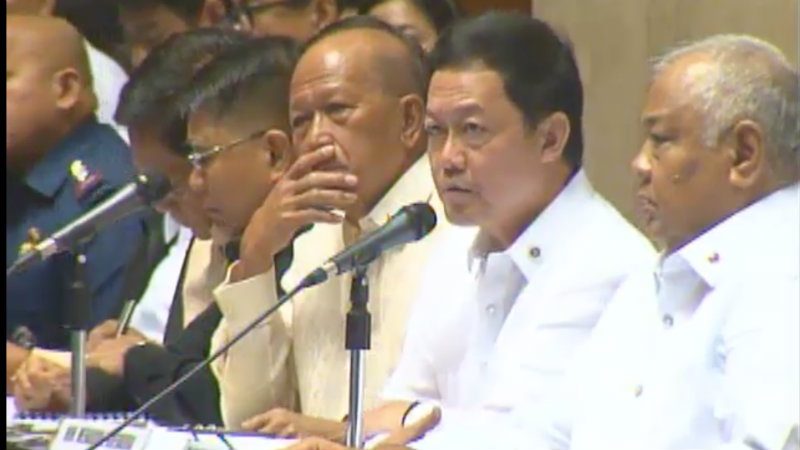SUMMARY
This is AI generated summarization, which may have errors. For context, always refer to the full article.

MANILA, Philippines – As they faced a joint session of Congress for the second time this year, the Philippines’ top security officials offered different reasons on why they want Mindanao to be under martial law until December 31, 2018.
President Rodrigo Duterte is asking Congress to approve a year-long extension of martial law in Mindanao, months after he declared Marawi City “liberated” from local terror groups. It was the Islamic State-affiliated Abu Sayyaf and Maute Group’s attack on the city that prompted the declaration on May 23.
The executive argues that although the war in Marawi is over, clashes continue in different parts of Mindanao as “remnants” of the groups that took over the city are attempting to gather fighters and resources for another attack.
“Marawi lang po iyon [It’s only Marawi City that was] cleared of terrorists. It does not include parts of Mindanao that are also subject to the influence of other groups,” said Defense Secretary Delfin Lorenzana, in reply to Act Teachers Representative Antonio Tinio during the joint session.
Lorenzana said that although the Armed Forces of the Philippines (AFP) initially wanted a mere 6-month extension, they eventually decided that a one-year extension was necessary because of the “vacuum” in operations elsewhere in Mindanao.
The defense secretary, himself a Mindanao veteran, explained that the rotation of troops for deployment to Marawi means that operations in other critical areas were set back by at least 6 months.
A one-year extension, he said, would give the military time to catch up on these operations.
AFP chief General Rey Leonardo Guerrero, for his part, said, “We determined that we need at least one year to achieve the objectives we have set in terms of finishing the threats posed by the terror groups, as well as other existing threats in Mindanao.”
It was the second joint session of Congress to discuss a request for an extension of martial law in Mindanao. Congress had earlier approved its extension until December 31, 2017.
Tinio wasn’t the only legislator who questioned the extension as well as the one-year time period. Buhay Representative Lito Atienza argued that the request went against the “intention” of the framers of the 1987 Constitution “that never again should any president be allowed to utilize martial law indefinitely.”
Albay 1st District Representative Edcel Lagman also argued that the Constitution does not intend for a “series of extensions” of the martial law proclamation.
Atienza, a member of the House minority, expressed concern that an extension now could mean that in the future, an extension of 2 or even 3 years would be justified. He said that instead, it should instead be a new declaration of martial law.
Senior Deputy Executive Secretary Menardo Guevarra, answering Atienza’s questions, said the Constitution itself explains Duterte’s request to extend martial law. He argued that ultimately, it’s up to Congress to determine if the extension is justifiable and for how long martial law would remain. – Rappler.com
Add a comment
How does this make you feel?
There are no comments yet. Add your comment to start the conversation.